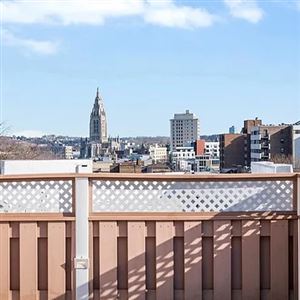Sisters Place is an agency that provides housing in Clairton to homeless single parents with children.
But if one neighbor has her way, the agency would become homeless.
The controversy surrounds the Sisters Place administrative headquarters, located in a rented house at 418 Mitchell Ave., a residential street.
It is about a mile or so away from the townhouse complex where Sisters Place owns 17 townhouses that house 27 client families that include 60 children.
At recent Clairton city council meetings, Sher Vaughan, who lives next door to the Sisters Place headquarters, has complained that the agency was improperly granted a zoning variance to operate in the residential neighborhood when it moved in May 2005.
In an e-mail to the Pittsburgh Post-Gazette, she said she is not opposed to the mission of Sisters Place, she just doesn't believe the administrative center should be located in a residential area. She also said there are other residents of the area who agree with her, but she didn't identify who those residents are.
The e-mail was sent in response to a request for an interview.
Mrs. Vaughan contends that when a hearing was held on the variance request by Sisters Place, the city did not properly advertise the hearing by posting it on telephone poles in the neighborhood and notifying residents. She has asked the city to revoke the variance, which would put Sisters Place out on the street.
But City Manager Ralph Imbrogno said the city is required only to advertise requests for variances in the legal section of the newspaper and that was done before the hearing on the variance was held. He said no one from the neighborhood attended the hearing.
Mrs. Vaughan maintains the Sisters Place headquarters disrupts the peace, quiet and safety of the residential neighborhood and makes parking difficult because employees park on the street; and that it violates city ordinances because it does not have a required business dumpster, handicapped ramps, parking and access.
Clairton City Manager Ralph Imbrogno said the city has investigated all of Mrs. Vaughn's complaints and can find no violations.
"The proper procedures have been followed for the zoning. The police have either zero or minimal calls in that area, let alone at Sisters Place and the allegations about code violations simply are not true," Mr. Imbrogno said.
As for parking problems caused by Sisters Place, Mr. Imbrogno said Mitchell Avenue is a public street and anyone can park there. He pointed out that Sisters Place is not the only nonresidential entity housed on the street.
The business offices of the Clairton City School District are located in a home in another block and a funeral home is located nearby.
Sisters Place employs nine full-time and three part-time people and that the employees try not to park in front of the Vaughan home.
Mr. Imbrogno said Mrs. Vaughan is the only neighbor who has complained.
Mrs. Vaughan cited two incidents that occurred there -- though she did not provide dates --that disturbed the neighborhood.
During one incident, she said a man chased a woman from the Sisters Place headquarters to her car, put his hand inside of her car as she drove away and then got into another car and followed her.
The other incident involved a man beating on the front door of the headquarters and screaming.
Sisters Place Program Director Judy Winstead said she was not aware of either of the incidents. Mr. Imbrogno said police were not called either time.
Mrs. Vaughan also cited the murder of a Sisters Place client in her town home on Dec. 23, 2003 and the man charged in her death was the father of her 4-year-old daughter. Following the murder, Sisters Place put steel bars on the windows and installed security systems at the townhouses inhabited by clients.
She said she believes that Sisters Place officials were dishonest by not mentioning the incident during the hearing on the variance.
"If Ms. Winstead feels the need for security systems and steel bars, why are they allowed to be located next door to a residential home," Mrs. Vaughan questioned in her e-mail.
Ms. Winstead said the murder occurred at the townhouse complex and not at the administrative center.
Sisters Place was created by a group of 14 female religious orders known as the Tri-Diocesan Sisters Leadership Conference. It's primary source of funding is the U.S. Department of Housing and Urban Development, though it also raises some of its own funds.
Sisters Place operates two programs in Clairton. One program is a transitional housing program that provides housing plus supportive services for up to two years. Those women must either be working or attending school.
The other program is for permanent housing and those women must have a permanent disability
It has operated in Clairton for the past 10 years. Before moving to Mitchell Avenue, Sisters Place administrative headquarters was located in the rectory of St. Clare of Assisi Church, but had to move when the church needed office space.
In the midst of the controversy, Sisters Place got good news this week. Its after-school program, which opened in October and is operated out of a townhouse at the Century complex, received a $20,000 grant from Highmark Blue Cross Blue Shield. The program serves 20 children who range in age from 6 to 12.
Ms. Winstead said Sisters Place wants to be a good neighbor to those on Mitchell Avenue and is hoping to be able to resolve issues that arise with neighbors in a friendly way.
Mr. Imbrogno said city officials will continue to monitor the situation.
First Published: August 30, 2007, 2:45 p.m.


















